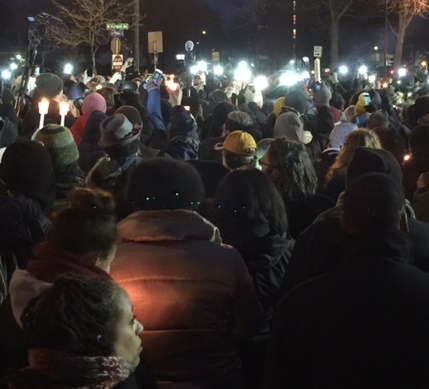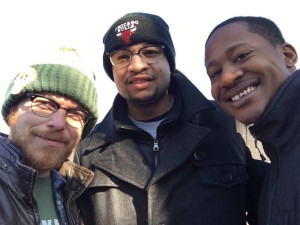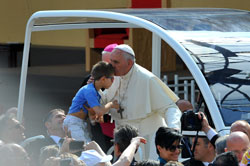Jay McDivitt, Waukesha, WI
Warm-up Question
On a scale of 1 to 10, 1 being “Totally cool” and 10 being “I’m afraid to get out of bed” – how would you rate your Fear Factor these days? How afraid are you? Of what?
Fear Factor
Bombs and guns ripped through Paris. Suicide bombing attacks kill hundreds at a funeral in Baghdad and a street scene in Beirut. Governors are shutting down borders to keep Syrian refugees out. France is asking the world to join them in waging war on ISIS/ISIL/Daesh/Whatever. And Starbucks refuses to put snowflakes and reindeer on their coffee cups.
The world just seems totally messed up.
In the midst of it all, this lovely story made the rounds on Facebook:
Gate A-4 By Naomi Shihab Nye:
Wandering around the Albuquerque Airport Terminal, after learning my flight had been delayed four hours, I heard an announcement: “If anyone in the vicinity of Gate A-4 understands any Arabic, please come to the gate immediately.” Well— one pauses these days. Gate A-4 was my own gate. I went there.
An older woman in full traditional Palestinian embroidered dress, just like my grandma wore, was crumpled to the floor, wailing. “Help,” said the flight agent. “Talk to her . What is her problem? We told her the flight was going to be late and she did this.”
I stooped to put my arm around the woman and spoke haltingly. “Shu-dow-a, shu-bid-uck, habibti? Stani schway, min fadlick, shu-bit-se-wee?” The minute she heard any words she knew, however poorly used, she stopped crying. She thought the flight had been cancelled entirely. She needed to be in El Paso for major medical treatment the next day. I said, “No, we’re fine, you’ll get there, just late, who is picking you up? Let’s call him.”
We called her son, I spoke with him in English. I told him I would stay with his mother till we got on the plane. She talked to him. Then we called her other sons just for the fun of it. Then we called my dad and he and she spoke for a while in Arabic and found out of course they had ten shared friends. Then I thought just for the heck of it why not call some Palestinian poets I know and let them chat with her? This all took up two hours.
She was laughing a lot by then. Telling about her life, patting my knee, answering questions. She had pulled a sack of homemade mamool cookies— little powdered sugar crumbly mounds stuffed with dates and nuts— from her bag and was offering them to all the women at the gate. To my amazement, not a single traveler declined one. It was like a sacrament. The traveler from Argentina, the mom from California, the lovely woman from Laredo— we were all covered with the same powdered sugar. And smiling. There is no better cookie.
Then the airline broke out free apple juice and two little girls from our flight ran around serving it and they were covered with powdered sugar too. And I noticed my new best friend— by now we were holding hands— had a potted plant poking out of her bag, some medicinal thing, with green furry leaves. Such an old country traveling tradition. Always carry a plant. Always stay rooted to somewhere.
And I looked around that gate of late and weary ones and thought, This is the world I want to live in. The shared world. Not a single person in that gate— once the crying of confusion stopped— seemed apprehensive about any other person. They took the cookies. I wanted to hug all those other women too.
This can still happen anywhere. Not everything is lost.
Discussion Questions
- Does fear help or hurt our ability to love each other and share moments like what happened in the airport?
- Has fear made it difficult for you to do the right thing? When has fear been helpful to you?
- Tell the story of finding joy or experiencing grace/love with someone who is very different from you.
First Sunday of Advent
(Text links are to Oremus Bible Browser. Oremus Bible Browser is not affiliated with or supported by the Evangelical Lutheran Church in America. You can find the calendar of readings for Year B at Lectionary Readings
For lectionary humor and insight, check the weekly comic Agnus Day.
Gospel Reflection
This is a creepy reading from the gospel of Luke. “Signs in the sun, the moon, and the stars…distress among nations…roaring of the sea…be on guard…be alert at all times…like a trap…” Yeesh.
Then again, it sounds kinda sorta exactly like the world in which we live. A world full of things and people to be afraid of. A world that is unpredictable and scary. A world that seems to get darker and darker every day.
So what are we to do as people of Jesus in this crazy world?
If you listen to some, the answer is, “Run and hide! Bury your head in the sand! Lock the doors and pretend it’s not happening! Be afraid – be very afraid!”
What does Jesus say, though? “Stand up and raise your heads, because your redemption is drawing near.”
Yup – when times get tough, when the world is scary, when you don’t know what to do, that is precisely when Jesus shows up. Jesus hangs in there with us when everyone else runs and hides. Jesus finds us in the scary places and gently lifts up our chins so we can look up and see the grace and goodness that God is still bringing into the world. The powdered sugar cookies shared among strangers who cannot speak one another’s languages. The patience to listen to fearful people and assure them that things will be okay. The sun that is rising in the east – the Light which no darkness can overcome.
Fear is natural and normal. Hope is countercultural. But fear won’t take away fear or make the world a more loving and living place. Hope can.
And Hope is totally in Jesus’ wheelhouse.
Discussion Questions
- Why is it easier to be afraid than hopeful?
- When have you felt hopeful in the midst of fear?
- When have you “closed your eyes” or “buried your head” out of fear? When have you opened your eyes, raised your head, and dared to be hopeful? When have other people helped you to be brave and hopeful rather than fearful?
Activity Suggestions
Materials: Blank paper, pens/pencils, colored pencils/crayons.
On one side of the paper, write “FEAR.” Draw or list/brainstorm things that you are afraid of – or things that others tell you to be afraid of. On the other side, write “HOPE.” Draw or list/brainstorm ways to be hopeful when you are tempted to be afraid.
Closing Prayer
: Light the first candle on the Advent wreath – or a candle, if you don’t have a wreath.
One: The light shines in the darkness.
Many: And the darkness cannot overcome it.
One: Let us pray. Holy One, we live in a scary world. Every day we see images and stories that make us want to bury our heads in the sand. Come to us in the Light of this flame. Help us to stand up and raise our heads and open our eyes to see Your Light. Remove our fear and give us Hope. In Jesus’ Name.
Many: Amen.



 A candlelight vigil on Friday, Nov. 20, in Minneapolis
A candlelight vigil on Friday, Nov. 20, in Minneapolis Ian McConnelll, Louis Tillman and Kendrick Dwight at the demonstration outside Minneapolis’ 4th Precinct station
Ian McConnelll, Louis Tillman and Kendrick Dwight at the demonstration outside Minneapolis’ 4th Precinct station Unfortunately, I think all too often assumed in this gathering of friends and family is the notion that we take a moment to actually be thankful … to take stock of what we are blessed with and how fortunate we are for so much abundance in our own lives – even at times when we live in scarcity. For me, Thanksgiving is a reminder that I may not have everything I want, but year after year, I have everything I need. I am also deeply mindful that my good fortune doesn’t belong to everyone.
Unfortunately, I think all too often assumed in this gathering of friends and family is the notion that we take a moment to actually be thankful … to take stock of what we are blessed with and how fortunate we are for so much abundance in our own lives – even at times when we live in scarcity. For me, Thanksgiving is a reminder that I may not have everything I want, but year after year, I have everything I need. I am also deeply mindful that my good fortune doesn’t belong to everyone.

